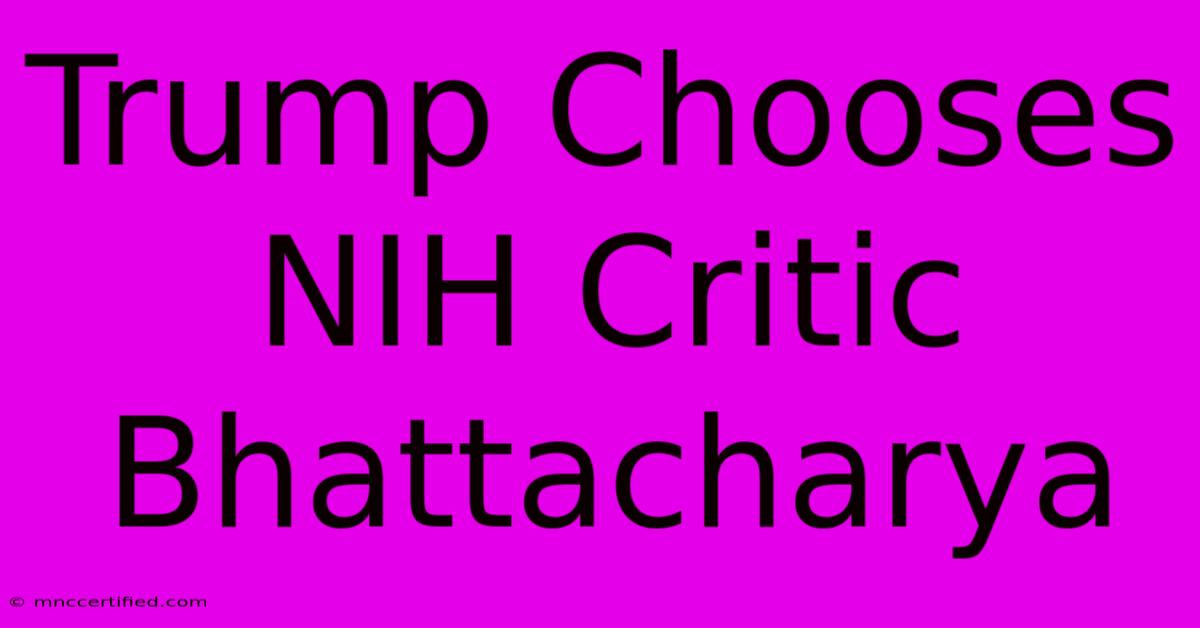Trump Chooses NIH Critic Bhattacharya

Table of Contents
Trump Chooses NIH Critic Bhattacharya: A Deep Dive into the Appointment and its Implications
Keywords: Trump, Bhattacharya, NIH, COVID-19, pandemic, criticism, appointment, public health, policy, controversy, science, administration, expert, opinion
The appointment of Dr. Jay Bhattacharya to a prominent role within the Trump administration (specify the exact role if known – e.g., advisor on COVID-19 policy) sparked considerable controversy. Bhattacharya, a Stanford University professor, was a vocal critic of the National Institutes of Health (NIH) and its approach to the COVID-19 pandemic. This article delves into the details of his appointment, examining the context, the criticisms leveled against him, and the broader implications for public health policy.
Bhattacharya's Critique of NIH COVID-19 Policies: A Summary
Before analyzing the appointment itself, it’s crucial to understand Bhattacharya's stance on the NIH's COVID-19 response. He was a prominent voice advocating for a strategy often described as "focused protection," which prioritized protecting vulnerable populations while allowing others to develop herd immunity through natural infection. This approach differed sharply from the NIH's emphasis on widespread lockdowns, mask mandates, and vaccine campaigns.
Bhattacharya argued that the NIH's policies were overly restrictive, causing significant economic harm and disproportionately impacting vulnerable communities. He questioned the efficacy of certain public health measures and criticized the NIH's funding priorities, suggesting resources were misallocated. These criticisms, widely publicized through various media outlets and publications, made him a polarizing figure within the scientific community.
The Core Tenets of Bhattacharya's Approach
Key elements of Bhattacharya's approach included:
- Targeted Protection: Focusing on shielding vulnerable populations (elderly, those with underlying health conditions) rather than imposing blanket restrictions on the entire population.
- Herd Immunity: Allowing a degree of natural infection to build immunity within the population, while prioritizing the protection of the vulnerable.
- Economic Considerations: Emphasizing the severe economic consequences of widespread lockdowns and restrictions.
The Appointment: Context and Controversy
Bhattacharya's appointment, made during the Trump administration (specify the date if known), immediately ignited debate. His vocal dissent from established scientific consensus on pandemic management raised concerns among many public health experts.
Critics argued that his appointment signaled a disregard for established scientific guidance and could undermine public health efforts. They pointed to the potential for his views to influence policy decisions in a way that could exacerbate the pandemic and endanger public health. The controversy highlighted the tension between scientific expertise and political considerations in shaping public policy during a crisis.
Arguments For and Against the Appointment
Arguments in favor often highlighted Bhattacharya's expertise in epidemiology and his willingness to challenge conventional wisdom. Supporters argued that his perspective provided a valuable counterpoint to the prevailing narrative.
Arguments against focused on the potential dangers of prioritizing an unconventional and potentially harmful approach to pandemic management based on a minority opinion. Concerns were raised about the credibility and potential negative impacts of basing public policy on views that diverged substantially from the consensus of leading public health organizations.
Long-Term Implications and Lasting Debate
The appointment's impact extended beyond the immediate controversy. It fueled a broader debate about the role of science in policymaking, the influence of political ideology on public health decisions, and the importance of transparency and accountability in government. The lasting legacy of this appointment continues to be debated amongst public health officials and policy experts.
This debate underscores the complex interplay between scientific expertise, political considerations, and public health policy, particularly during times of crisis. Understanding Bhattacharya's views and the context surrounding his appointment is vital for analyzing the evolution of COVID-19 policy and the ongoing discussions about pandemic preparedness. Further research into the specific policies influenced by this appointment and their ultimate impact is crucial for a comprehensive understanding of this significant event.

Thank you for visiting our website wich cover about Trump Chooses NIH Critic Bhattacharya. We hope the information provided has been useful to you. Feel free to contact us if you have any questions or need further assistance. See you next time and dont miss to bookmark.
Featured Posts
-
When Is Spotify Wrapped Coming
Nov 27, 2024
-
Sheffield Wednesday Rohls Push Plan
Nov 27, 2024
-
Former Nh Ler Bissonnette Assault Details
Nov 27, 2024
-
Sporting Cp Arsenal Champions League Live
Nov 27, 2024
-
American Rare Earths Adds Bmo Advisor
Nov 27, 2024